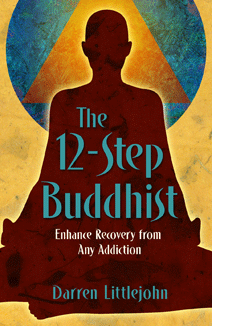
To God or not to God. That is the question. At least if you're trying to work a 12-Step program anyways. At the crux of any decision, from the most trivial to the most serious, is the intention to "turn it over" to a Higher Power or stay in self-will. But in the Dharma we have no such "other" to turn anything over to. Not in the sense that a deity will save us from ourselves. There are those who pray to Buddhas as if they are Gods. And they might get answers, who knows. But what has always drawn me to Buddhism was the feeling that somewhere within us all is the wisdom that we need.
On a TV interview the host asked me, "Well how do you give it up to a Higher Power in Buddhism?" My answer was that in the book I talk about simple ways to turn our power of choice over to higher principles. We can use Buddhist techniques of meditation to experience many levels of understanding on any of the main spiritual principles of recovery. But it all comes down to the ability to be comfortable in our own skin. What good is practice if we can't shake the feeling that we're flawed at the core. And that's exactly how I felt after decades of praying to God to spare me from an acute, chronic psychic pain. Maybe that kind of spirituality works for some people who are comforted enough by the notion of salvation that they can tolerate their misery. But it doesn't work for me or, as I'm finding since the book came out, for many people who are, or would like to be in recovery. For us, Praying to God is a FAIL.
I admittedly don't know how to use theism, or the belief in an outside force, to feel better. As much as I've tried to use externals to change my feelings it's never worked on any long term basis. Be it from drugs, women, grades, raises, applause, laughter - temporary relief always fades. And guess what doesn't? That pervasive dark feeling of dis-ease, shining black through like a reverse sunrise-blinding any glimmer of satisfaction that the crack of quick cash or a fat stash or batting eye lash could give me. Gone. And there I am left to feel, one more time, like I'm stuck in the wrong side of a colon.
The solution for feeling this way is to practice the principle of the first step. But for me, with a dose of Dharma to take it deeper. That principle is self-acceptance. If AA is right and pain is the touchstone of all spiritual growth then the Buddha was right when he pointed out that all actions in samsara (endless cycle of of rebirth) lead to suffering. We can meditate until our pursed lips are purple with exertion to transcend the pain of being or we can learn to be, being-as the ache inside our souls pulses on. Breathing in, acknowledge, "Yeah it $*&ing hurts." Breathe out, "I'm not the only one who feels this way." Next level. On the in breath I consider, "What would it feel like if my heart was big enough to willingly take on the sufferings of others- from those I supposedly love to those I hate without doubt. What would my experience of self be like?"
Somehow in the course of working with meditations like this I acknowledge within myself a space of self generated self-acceptance. It is real, not the result of peripheral grace. So where does this sense of being come from?
Rather than a God outside who happened to smile favorably upon me, this realization is of an aspect of myself, which I choose to call Buddha, who kept coming back and kept coming back to trade bliss for pain, deep knowledge for deep sleep, until the rest of me could get it, use it, apply it and do it. That trading self for others practice-perfected. We do the practices of Enlightened Beings to gain the understanding of Enlightened Beings. In this sense the Dharma is a gift. The application, like prayer, is up to us. But the result, unlike theistic prayer, is also up to us. In learning to trade self for others we learn acceptance of self and others.
Another view might be that Awakened Ones have given us the teachings, methods and advice for how we can come to our own place of self-love and stop hurting ourselves and others. They're different beings than us but share the same Awake nature. Please don't confuse this with the infantile notion that we're all one being. (That thinking is a kind of sickness in my view.) The way I'm talking about enlightenment here is more analogous to all of the infinite molecules, elements and matter and consciousnesses that make up everything sharing the same basic space. This cup and that cup are two different cups in that yours was made then and of different colored material and mine another time and this color but the same in that they're not as separate or independently arising as they appear. Yet yours holds wine and mine sparkling cider. Please don't mix them up!
Whether we're in the mindset to view the Buddha as ourselves trying to wake ourselves up or as somebody else who's shared the same sufferings, the onus is still on us to get out of hell, or learn how to breathe fire. The practice of self- acceptance is still the key because it is the practice of accepting our pain and subsequently enables us to understand the pain of others.
Learning to be, trading ourselves for thee, there is a you and there us a me, just not as concrete as it seems to be. But we share the same space as we and thus are free to be. See?
****
